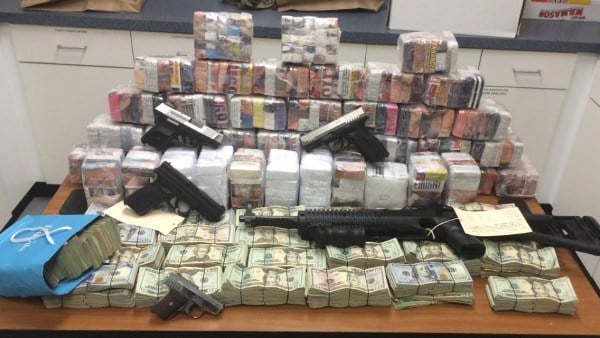Casinos have historically been at risk of exploitation by those seeking to launder criminal property. We look at five things you need to know about the problem, rules and changes to sector guidance.
21 charged in casino-based money laundering scheme. The case is the latest in an FBI crackdown on money laundering in Las Vegas, but the alleged criminal behavior extended far beyond city. NSW's gaming regulator bans Crown Resorts from opening its $2.2 billion Barangaroo casino next month, after the company admitted money laundering had likely occurred through some of its VIP accounts.
Trump Casinos Laundered Money
- Obstructing the use of casinos as a vehicle for money laundering is a constant battle between law enforcement, criminals and casino operators. In the UK, customer check procedures are continuously improving, and in its current state, the system is highly impenetrable. The same rings true for much of Europe and North America.
- Casino establishments are highly vulnerable for money laundering due to the financial structures of its business. Money laundering in the casino does not necessarily takes the form of currency transactions but may also take money instruments forms such as credit cards and wire transfer.
Bicycle Casino Money Laundering
1. Why is this important?
The nature of services and products offered by the gambling industry can make it attractive to criminals seeking to launder or disguise the origins of criminally derived funds. Significant risk factors in this industry include the prevalence of cash transactions, accessibility to multiple premises and anonymity on the part of the customer.
2. Who is covered by the rules?
New anti-money laundering provisions relating to casinos were brought in by the Money Laundering Regulations 2017 (MLR 2017) on 26 June 2017. A key change is that all casino operators, both remote and non-remote, are now caught by MLR 2017, rather than simply holders of a casino operating licence. A remote casino operator will be caught by the MLR 2017 if they have at least one piece of remote gambling equipment situated in the UK or if the gambling facilities provided by the remote casino are used in the UK.
This means that non-casino gambling providers, such as betting shops, are not covered by the MLR 2017.
3. What are the rules?
Under the MLR 2017, casino operators have a legal obligation to do the following:
- Risk assessment: conduct a written risk assessment in respect of money laundering risks faced by the business and ensure that there are adequate procedures in place to deal with those risks.
- Customer due diligence: conduct risk based customer due diligence (CDD) when they:< >establish a business relationshipsuspect money laundering or terrorist financingdoubt the veracity or adequacy of documents or information previously obtained for the purposes of identification or verification.Nominated officer: appoint a member of the firm as their nominated officer (i.e. outsourcing is no longer possible) as well as a member of the board of directors (or equivalent) as the officer responsible for compliance.
- Reliance on third parties: accept ultimate responsibility for compliance with MLR 2017, even where they are entitled to rely on CDD carried out by third parties.
In July 2010, the Gambling Commission, which oversees the casino industry’s compliance with their anti-money laundering obligations, published a guidance note entitled “Money laundering: the prevention of money laundering and combating the financing of terrorism: Guidance for remote and non-remote casinos” (PDF). This guidance was updated in 2011 and 2016 following changes in the law.
4. How are the rules/guidance changing?
In light of the changes brought about by the MLR 2017, and also the Criminal Finances Act 2017, the Gambling Commission’s guidance note has been revised to a new fourth edition to assist casino operators in complying with the latest requirements. The updated guidance went out to consultation in July 2017. Responses are sought by 8 September 2017.
The consultation document invites feedback on the above amendments and, in addition, asks for views on whether or not the Gambling Commission should remain the sole supervisory authority for money service business activities provided by non-remote casinos.
5. What can casino operators do to comply with the amended regulations?
Casino Money Laundering

Casino operators can ensure they have effective anti-money-laundering and counter-terrorist financing measures in place by taking the following steps:
- Risk assessment: review and revise the risk assessment, covering issues such as customer profile, premises and remote sites and incidents of actual or suspected attempted money laundering.
- Policies and procedures: review and revise policies and procedures in light of the identified risks. Ensure that the policies and procedures are properly disseminated and appropriate training is provided on them to front line staff.
- Senior management commitment: senior management must be fully engaged in developing and maintaining procedures and controls which are necessary to manage the risks identified in the casino operator’s risk assessment.
- Record keeping: keep records of all anti-money-laundering policies, procedures and controls and all ongoing transactions with customers. Records of CDD identification and verification must be maintained for at least 5 years.
- Suspicious activity reports: providing appropriate training to all relevant employees to enable them to make a report where they know, suspect (or have reasonable grounds to know or suspect) that a person is engaged in actual or attempted money laundering or terrorist financing.
